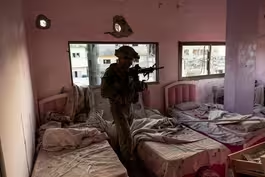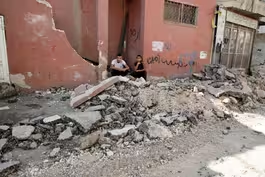
How the White House views Israel's military campaign
Clip: 11/8/2023 | 7m 15sVideo has Closed Captions
How the White House views Israel's military campaign
As the death tolls among Palestinian civilians in Gaza continues to climb, more allies of Israel are starting to criticize the country for the military tactics it has been using since the Oct. 7 Hamas attack. John Kirby, National Security Council spokesman at the White House, joins Amna Nawaz to discuss U.S. diplomacy around the Israel-Hamas war and support for Israel's military campaign.
Problems playing video? | Closed Captioning Feedback
Problems playing video? | Closed Captioning Feedback
Major corporate funding for the PBS News Hour is provided by BDO, BNSF, Consumer Cellular, American Cruise Lines, and Raymond James. Funding for the PBS NewsHour Weekend is provided by...

How the White House views Israel's military campaign
Clip: 11/8/2023 | 7m 15sVideo has Closed Captions
As the death tolls among Palestinian civilians in Gaza continues to climb, more allies of Israel are starting to criticize the country for the military tactics it has been using since the Oct. 7 Hamas attack. John Kirby, National Security Council spokesman at the White House, joins Amna Nawaz to discuss U.S. diplomacy around the Israel-Hamas war and support for Israel's military campaign.
Problems playing video? | Closed Captioning Feedback
How to Watch PBS News Hour
PBS News Hour is available to stream on pbs.org and the free PBS App, available on iPhone, Apple TV, Android TV, Android smartphones, Amazon Fire TV, Amazon Fire Tablet, Roku, Samsung Smart TV, and Vizio.
Providing Support for PBS.org
Learn Moreabout PBS online sponsorshipAMNA NAWAZ: Tonight, two American F-15s conducted an airstrike in Eastern Syria against what the U.S. identified as a weapons storage facility used by Iran's Revolutionary Guard Corps and its affiliates.
It's the second U.S. airstrike on Iranian-backed groups since the October 7 Hamas terrorist attack on Israel, and it follows nearly 40 attacks by those groups on U.S. troops in Iraq and Syria.
Before the strike, I spoke with John Kirby, spokesperson for the National Security Council at the White House, about the diplomacy around the Israel-Hamas war and Israel's military campaign.
Admiral Kirby, welcome back to the "NewsHour."
Thanks for joining us.
JOHN KIRBY, NSC Coordinator For Strategic Communications: Thanks for having me.
AMNA NAWAZ: So there are reports of talks under way for a potential three-day pause in fighting.
First, can you confirm those talks?
And then how do you ensure that any pause doesn't allow Hamas to just rearm, regroup and fight even longer?
JOHN KIRBY: I can't confirm those specific reports, but I absolutely can confirm that we are in constant touch with our Israeli counterparts and our partners in the region about the necessity, the need, the importance, the criticality -- criticality of humanitarian pauses, temporary, short-term, localized pauses in the fighting that will allow us to get aid and assistance in and to get people out, particularly our hostages.
So there are active discussions going on right now about the probability of doing that.
AMNA NAWAZ: And how do you make sure in any pause that Hamas doesn't just use the time to regroup?
JOHN KIRBY: Of course.
I mean, that's why we don't favor a cease-fire right now, a cessation of hostilities across Gaza, because that would really benefit Hamas.
They would be able to arm, plan, execute additional attacks.
Plus, it kind of validates what they did on October 7.
But these pauses would be in place.
Again, we're not taking anything that Hamas says at face value, but it would be done with the understanding that they would meet their obligations under this localized, temporary pause in the fighting to allow for the movement of people or humanitarian goods.
And obviously, we would, with our Israeli counterparts, monitor it as best we could.
AMNA NAWAZ: So, we know Israel has so far rejected any calls for a pause.
Are they receptive now?
JOHN KIRBY: There have been ongoing conversations with the Israelis.
I don't want to speak for them, but you heard Prime Minister Netanyahu just over the last 24 hours or so acknowledge that short-term pauses were something he'd be willing to consider, and he has done it already.
I mean, it's not like no pauses have occurred.
There have been a couple of short-term pauses while we worked on getting hostages out.
AMNA NAWAZ: Well, the pauses were just to get hostages out previously.
I mean, they didn't last more than a few hours at a time.
Is that what you're looking for here?
JOHN KIRBY: It could be.
It could be a few hours.
It could be longer than that.
It could be a few days in extent.
I mean, it really kind of depends on the specific purpose for the pause.
Each pause would be developed, again, with a list of criteria, why you're doing it, and for how long you're going to do it, and over the map, like, what -- the geographic area that the pause is going to apply, because it wouldn't apply for all of Gaza.
So each one's going to be taken a little bit in its own turn.
AMNA NAWAZ: But we had an assessment from the United Nations secretary-general today about the way the war has unfolded so far.
He cited the number of thousands of Gaza children killed so far, and he said that means that there's something -- quote -- "clearly wrong" in the way that the Israeli military operations have unfolded.
Is he wrong?
JOHN KIRBY: Well, we certainly share the concern about the civilian casualties.
Many, many thousands of innocent Palestinians have been killed, and each death is a tragedy.
Each one should be grieved and mourned, and, obviously, each one should be prevented.
And we have been stressing and urging our Israeli counterparts to be as discriminant and cautious, as careful as possible as they prosecute these operations, so as not to take more innocent Palestinian life.
Now, the Hamas terrorist group is literally putting these civilians in harm's way by sheltering underneath their homes and having command-and-control centers in their hospitals.
But, again, that doesn't mean that Israel is absolved of the added burden of doing everything that they can to avoid civilian casualties.
And, again, we're going to keep talking to them about that.
AMNA NAWAZ: Well, you said you have been encouraging them to be as discriminant and careful as possible.
We're now a month into the war.
Have they been as discriminant and careful as possible so far?
JOHN KIRBY: I think we would all agree that there have been too many civilians killed through the conduct of these operations.
I think we agree that the death toll is high, and we don't want to see any civilians killed.
That's why we're going to continue to urge our Israeli counterparts to abide by the law of armed conflict and to respect innocent civilian life to the maximum extent possible.
AMNA NAWAZ: Is that to say you don't believe that they have been as discriminant and careful as possible so far?
JOHN KIRBY: We're not going to armchair quarterback every single strike or event or operation that they're conducting.
We want to make sure they have got the tools and capabilities to do their military operations effectively.
And that includes the perspective of the United States and our own experience in urban warfare and in trying to limit civilian casualties.
AMNA NAWAZ: So, Secretary Blinken said today there should be no reoccupation of Gaza after the conflict ends.
Does Israel's plan to have what they call overall security responsibility indefinitely over Gaza go against that?
JOHN KIRBY: Well, again, I'd let Prime Minister Netanyahu speak for himself and his views on what post-conflict Gaza is going to look like from their perspective.
AMNA NAWAZ: What is your and the U.S.' understanding of that, though?
JOHN KIRBY: We don't believe that it should be reoccupied.
And, obviously, as Secretary Blinken also said, it's possible that there could be some sort of a transitional period where you're going to have Israeli security forces on the ground in the immediate aftermath of the conflict providing some measure of security.
But we don't believe that's a long-term solution that's viable, and it's not going to be in keeping with the aspirations of the Palestinian people.
AMNA NAWAZ: And just looking for some semantic clarity here, when they say overall security responsibility indefinitely, and you say no reoccupation, are those two things in conflict?
JOHN KIRBY: I can't speak for the Israelis.
I can only speak for the administration.
We don't believe that there should be a reoccupation of Gaza, that the future of Gaza, the governance of Gaza in the long term, number one, can't be by Hamas.
We can't go back to October 6.
And, two, it should be in keeping with the aspirations of the Palestinian people.
They have a voice.
They have a vote.
They should get to determine what their future looks like.
AMNA NAWAZ: Admiral, before I let you go, I have to ask about any update you can offer on the Americans you still believe to be held hostage by Hamas.
Have you had any confirmation at this point, one month into the war, they're all still alive?
JOHN KIRBY: We haven't heard any confirmation to the contrary.
So we're still trying to get more information about where they are and how they're being kept, the conditions they're in.
We still believe it's less than 10 Americans that are being held hostage, along with more than 240 other people who Hamas continues to hold hostage.
All of them should be returned to their families immediately.
Hamas should release them all.
Short of that instantaneous release, we're going to keep working with our partners to do everything we can to get more information about where they are, how they are, and get them released.
AMNA NAWAZ: Admiral John Kirby, spokesperson for the National Security Council, thank you again for your time.
JOHN KIRBY: My pleasure.
America's top diplomat lays out vision for post-war Gaza
Video has Closed Captions
Clip: 11/8/2023 | 5m 11s | Israel's ground invasion grinds on as Blinken lays out vision for post-war Gaza (5m 11s)
Explaining the staggering rise in babies born with syphilis
Video has Closed Captions
Clip: 11/8/2023 | 5m 24s | Explaining the staggering rise of syphilis in newborn babies (5m 24s)
Opera Philadelphia pushes forward amid financial uncertainty
Video has Closed Captions
Clip: 11/8/2023 | 6m 48s | Opera Philadelphia pushes forward amid financial uncertainty (6m 48s)
Reproductive rights drive wins for Democrats
Video has Closed Captions
Clip: 11/8/2023 | 9m 24s | Reproductive rights drive wins for Democrats, leaving clues for future elections (9m 24s)
West Bank Palestinians try to save homes
Video has Closed Captions
Clip: 11/8/2023 | 7m 36s | West Bank Palestinians try to save their homes from Israeli extremists (7m 36s)
Why school board elections are garnering national attention
Video has Closed Captions
Clip: 11/8/2023 | 4m 51s | Why school board elections are garnering national attention (4m 51s)
Providing Support for PBS.org
Learn Moreabout PBS online sponsorship
- News and Public Affairs

FRONTLINE is investigative journalism that questions, explains and changes our world.

- News and Public Affairs

Amanpour and Company features conversations with leaders and decision makers.












Support for PBS provided by:
Major corporate funding for the PBS News Hour is provided by BDO, BNSF, Consumer Cellular, American Cruise Lines, and Raymond James. Funding for the PBS NewsHour Weekend is provided by...





